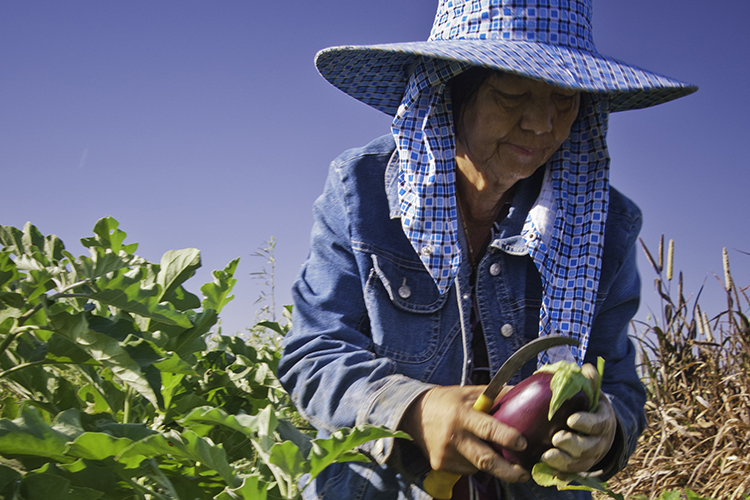Poll finds broad support for farmworkers who labor through pandemic
Majorities of Democrats, Republicans and independents agree employers should provide health and economic protection to farmworkers at risk of COVID-19, the Institute of Governmental Studies reports
May 8, 2020

Farm workers are crucial to food production and economic strength in California and the nation, but they often lack health and economic protections. (Photo via Wikimedia Commons by Tony Webster | CC BY-SA 2.0)
Californians strongly support health and economic protections for farmworkers who stay on the job despite the risks posed by the COVID-19 pandemic, according to a new poll by UC Berkeley’s Institute of Governmental Studies (IGS).
Though Democrats expressed the strongest support, clear majorities of Republicans and independents agreed that employers should provide farmworkers with equipment and sanitation facilities and offer full sick pay to those who fall ill because of virus.
But significant geographic divides were evident: The farmworkers found much stronger support in urban areas around Los Angeles and San Francisco, with lower support in the Central Valley and the Inland Empire, where much of the state’s farming takes place.
“Californians are, by and large, willing to support farmworker protections, regardless of legal status,” said IGS co-Director Cristina Mora. “Now, whether this support also translates for other worker benefits beyond COVID-19 is another story, and only time will tell if these sentiments are long-lasting.”
The Berkeley IGS Poll of 8,800 registered California voters was conducted online, in English and Spanish, between April 16 and April 20, in conjunction with the UC-based California Institute of Health Equity and Action. It is one of the first U.S. efforts to gauge opinion on the COVID-19 pandemic and its impact.
The poll noted that California farmworkers harvest over a third of U.S. vegetables and over two-thirds of the nation’s fruits and nuts. The laborers, many from Mexico, have been deeply vulnerable during the crisis because they lack job security, health insurance and sanitation facilities — and often legal protection.
But according to the poll, most Californians believe they deserve protection during the pandemic, no matter their legal or immigration status. Among all poll respondents:
- 94% said employers should provide hand-washing stations, personal protective equipment and workplace conditions that allow them to meet the physical distancing standards recommended by health authorities;
- 71% said that when farmworkers fall ill with COVID-19, employers should provide full replacement wages;
- 80% supported equitable medical and paid sick leave for both documented and undocumented farmworkers who are ill with the virus; and
- 79% supported equal pay, regardless of the laborers’ legal status or guest worker status.
To be sure, there were significant political disagreements. For example, when asked whether employers should provide full sick pay to farmworkers who must stay home because they are ill with the virus, 61% of Republicans expressed support or strong support, while 21% were neutral. But 92% of Democrats expressed support or strong support.
A geographic assessment of opinion showed a similar divide. In every region of the state, a majority of voters agreed that undocumented farmworkers should receive the same medical and sick leave benefits as documented colleagues. In Los Angeles, just under 80% expressed support, along with 77% in the Bay Area. That support fell to 63% in the Central Valley, a major U.S. agricultural center.
The IGS report on public opinion regarding farmworkers was the third in a series arising from the April poll. The first report, released May 1, found that California voters were deeply divided about the COVID-19 pandemic, with supporters of President Donald Trump more worried about the economy and less concerned that they will infect others. A second report, released May 6, found that people of color in California face elevated health and economic risks resulting from the pandemic.